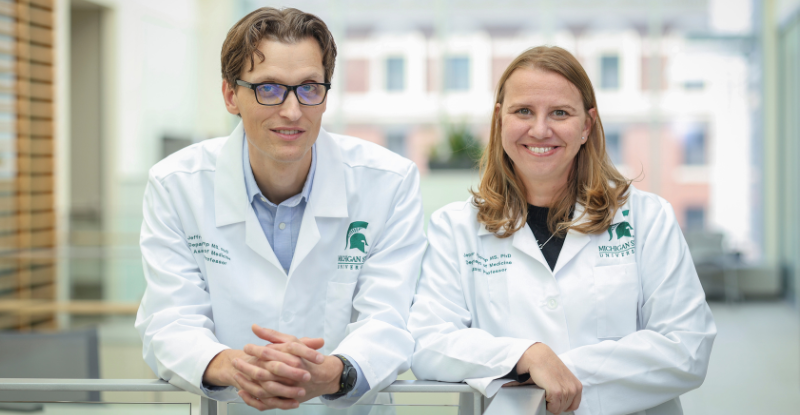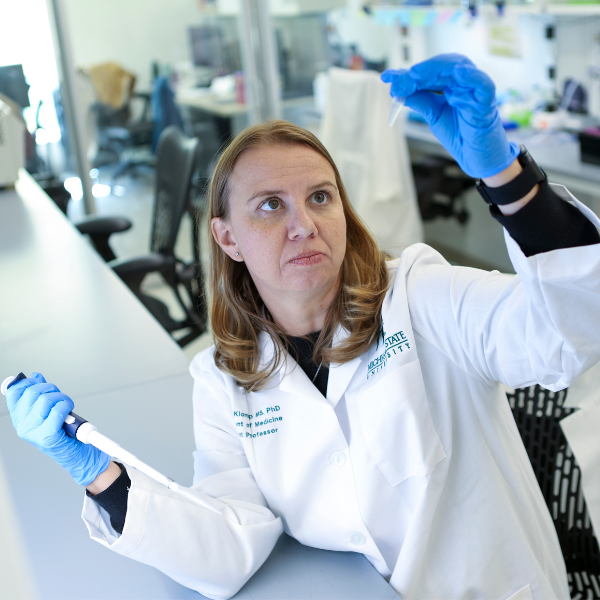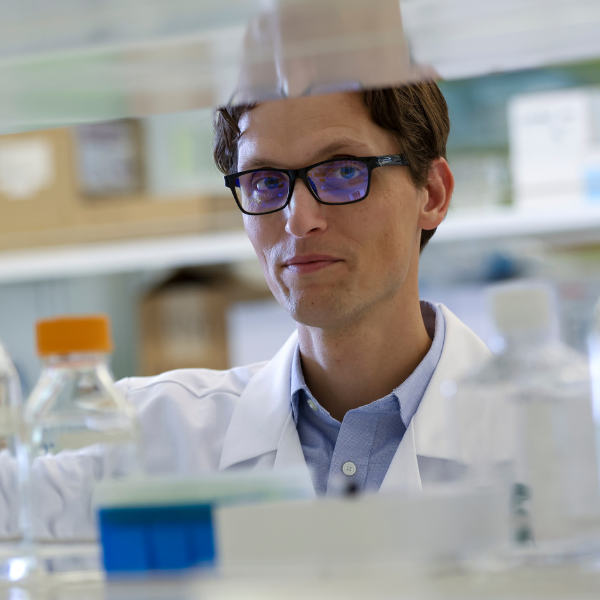College of Human Medicine Recruits Leading Cancer Researchers Jeff and Jenny Klomp
October 28, 2024
On a sunny morning this past June, scientists around the world woke up to news that could fundamentally change the game in cancer research and care. And two of the people behind that breakthrough are now working at Michigan State University.

Jenny Klomp, PhD, and Jeff Klomp, PhD, were recently recruited to the College of Human Medicine as assistant professors in the Department of Medicine. They began establishing their labs at the Grand Rapids Research Center in August.
“I think their work is an amazing fit for MSU’s overarching goals,” said Chaz Hong, MD, PhD, department chair, who called the research “really breathtaking stuff” and referred to the couple as “conquering heroes.”
The Klomps, who are both originally from Hudsonville, were hired at MSU after working in the lab of Dr. Channing Der at the Lineberger Comprehensive Cancer Center, at the University of North Carolina at Chapel Hill.
They and their colleagues created what the director of the National Institutes of Health called “the most comprehensive molecular portrait yet of the workings of KRAS”—a gene that plays a crucial role in cell signaling and regulation.
The Klomps were each a lead author on papers published in June, which revealed insights that experts in the field say will result in more effective treatments, better prediction of treatment responses, and new strategies to overcome drug resistance in KRAS-driven cancers—including pancreatic, lung, and colorectal.
Mutations in the KRAS gene are found in about 90% of cases of pancreatic cancer—the third leading cause of cancer-related deaths in the United States.
KRAS mutations are also present in up to 36% of lung cancer cases, and up to 50% of colorectal cancer cases—the first and second leading causes of cancer deaths in the U.S.
Hong said the Klomps found that inactivating the KRAS protein “could be an amazing way to stop these cancers dead in their tracks.”
Just a few weeks after their papers were published in the journal Science, the work was highlighted in the blog of NIH director Monica M. Bertagnolli, MD.
“For such an esteemed cancer researcher…to acknowledge the work lends a high level of credibility and recognition,” said Shirish Gadgeel, MD, professor in the Department of Medicine, and chief of the Division of Hematology and Oncology at the Henry Ford Cancer Institute. “This work will be the basis of developing effective treatments for KRAS mutation positive cancers.”
MSU’s partnership with Henry Ford Health was just one of the reasons the Klomps were eager to accept positions in the College of Human Medicine.
 “There’s so much momentum and excitement about cancer research at Michigan State,” said Jenny. “The ambitions that Michigan State has in cancer research and working collaboratively with Henry Ford, all of it seemed to fit and be very exciting.”
“There’s so much momentum and excitement about cancer research at Michigan State,” said Jenny. “The ambitions that Michigan State has in cancer research and working collaboratively with Henry Ford, all of it seemed to fit and be very exciting.”
“We wanted to go to a university where we would be collaborating with the people next to us—not competing against them.”
Jeff agreed, noting that competition in research is an “outdated mindset.”
"Collaboration is key. The papers we publish now are very deep, very broad, and very technological, and I don’t think any one person can successfully do that for a long time. You will burn out.
“We don’t want to replicate each other’s work just for the sake of trying to be the first.”
“It’s much more powerful, especially when you can find groups that have similar overarching questions but very different approaches to asking them," said Jenny. "I think it’s the future of science. I could never have done this project by myself. And Jeff could never have done this project by himself.”
She added that the couple considered positions at multiple universities, but their desire to partner with other labs and programs seemed right at home at MSU.
 “What we were really excited about is that Michigan State seemed like a very collaborative environment,” Jenny said. “There’s a lot of sharing of resources, sharing of data, sharing of thinking—and we were excited about that.”
“What we were really excited about is that Michigan State seemed like a very collaborative environment,” Jenny said. “There’s a lot of sharing of resources, sharing of data, sharing of thinking—and we were excited about that.”
Hong said having the Klomps at MSU will make a difference not just for researchers locally, but for people who study and treat cancer around the world.
“I believe Jenny and Jeff’s breakthrough work will soon pay dividends for our cancer doctors, to point out which available drug or combination of drugs they need to use for individual cancer patients,” he said. “This approach may allow us to successfully manage even the most advanced cancers, just like how we turned AIDS from a horrible, universally fatal disease into something you can live with.
“Really breathtaking stuff,” added Hong.
By Lisa L. Hayes
More Cancer Research News ![]()
Researchers in the Department of Medicine have unveiled a potential game-changer in the fight against glioblastoma, the most common and currently incurable form of brain cancer.


